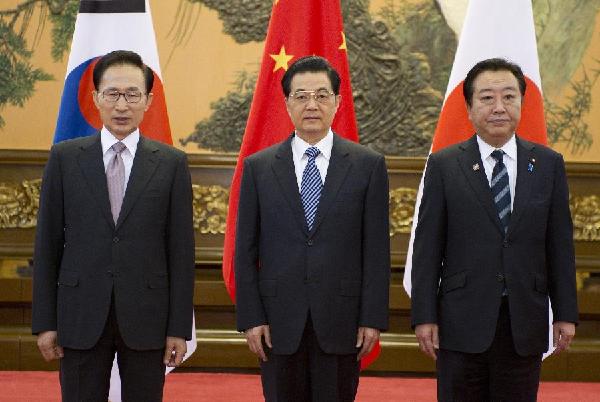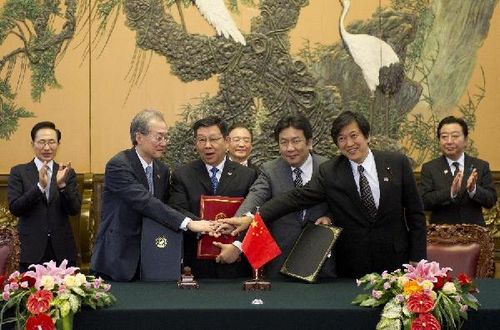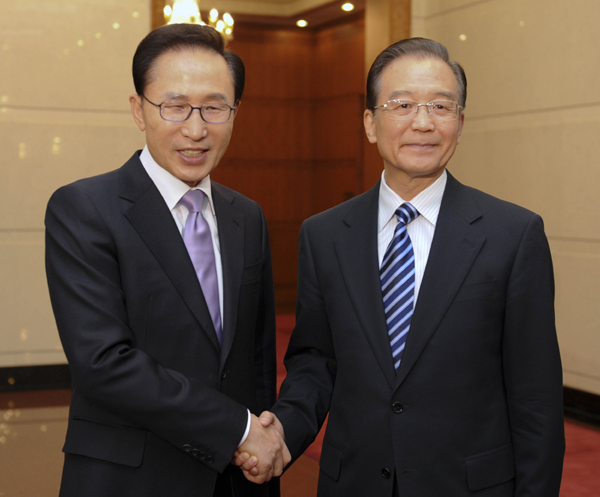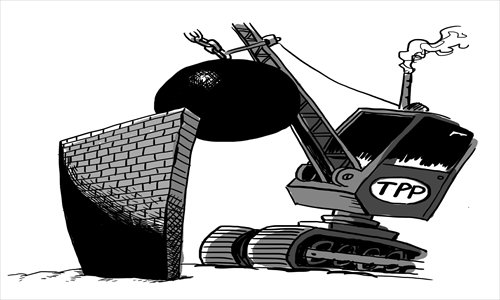HOME >>
China, Japan and South Korea launched FTA negotiations
Source:Globaltimes.cn Published: 2012-11-22 16:35:00
|
Latest News
|
| FTA negotiations between China, Japan, S.Korea to begin next year Trade ministers from China, Japan and South Korea announced Tuesday the launch of the Free Trade Area (FTA) negotiations, a move that will strengthen economic ties of the three major economies, China's Ministry of Commerce (MOFCOM) said Tuesday. |
|
Benefits |
|
Viewpoints
|
◆Boosting domestic demand will require a lengthy time to show results as the economy depends on the low labor costs, which led to a comparatively weak domestic consumption. China needs to find a new route and FTAs are one alternative. ------Liu Jinhe, a research fellow at Samsung Economic Research Institute
◆An FTA is strongly in the economic interest of all three countries, but it is unlikely to come into existence in the near term for both international reasons and the domestic situation in Japan and South Korea.------John Ross, a visiting professor at Antai College of Economics and Management of Shanghai Jiao Tong University
◆Taking a glance at Asia's free trade area map, one can feel not only the invisible forces that seek to edge out China, but also China's restraint and tolerance. Undoubtedly, China has already become the engine of the Asian economy, and politically the most influential country in this region.------Global Times editorial
◆The China-Japan-South Korea FTA can allow these countries to fully play to their own advantages and work together to avoid economic turmoil, because they are geographically close and economically complementary to each other.------Zhang Jianping, a researcher at the Academy of Macroeconomic Research under the National Development and Reform Commission
◆Territorial disputes between China and Japan as well as Japan and South Korea presented indirect obstacles for the FTA talks.------Mei Xinyu, a researcher with the Chinese Academy of International Trade and Economic Cooperation affiliated to the Ministry of Commerce
| FTA agreements
|
| Operating FTA agreements | |
| NAFTA |
It was signed in December of 1992 and known in full as the North American Free Trade Agreement. |
| APTA |
Asia-Pacific Trade Agreement was signed in 1975 as the longest standing preferential trade agreement among developing countries in the Asia-Pacific region. |
| AFTA |
ASEAN Free Trade Area was signed in January of 1992, it covers all 10 ASEAN members. |
| TPP |
It was signed in 2005, it is known in full as the Trans-Pacific Partnership which is a multilateral free trade accord that strives to liberalize the economies of the Asia-Pacific region. |
| Negotiating FTA agreements | |
| AEC |
Fully known as the ASEAN Economic Community, it is aimed at achieving a single market for free movement of goods, services, capital and skilled laborers among the ASEAN members. |
| EAFTA |
Or East Asia Free Trade Agreement or ASEAN+3 (China, Japan and South Korea), it is aimed at forging a free trade area among these economies. |
| CEPEA |
Or Comprehensive Economic Partnership for East Asia or ASEAN+6 (Australia, China, India, Japan, New Zealand and South Korea), it is aimed at forming a free trade area. |
| More | |
|
Related News
|
 |
East Asia big three agree on free trade talks in the 5th trilateral summit China, Japan and South Korea have agreed to launch talks on a free trade area (FTA) by the end of this year, Premier Wen Jiabao said on May 14 after a trilateral meeting in Beijing. |
 |
China, Japan and ROK ink investment deal China, Japan and the Republic of Korea (ROK) signed a deal on May 13 in Beijing to promote and protect trilateral investment after more than 13 rounds of talks over the past five years. |
 |
China, South Korea edge closer to FTA Beijing and Seoul have vowed to improve their handling of fishery disputes and to start formal talks on a free trade agreement (FTA), according to a joint communique released on January 11 after a visit by South Korean President Lee Myung-Bak. |
 |
New agreements by US do not block Asian integration The role of the US in the Diaoyu Islands dispute has been hotly discussed recently. Some observers hold that the dispute is a conspiracy by the US, intended to disturb the economic integration of East Asia and facilitate the development of the TPP. |
Posted in: